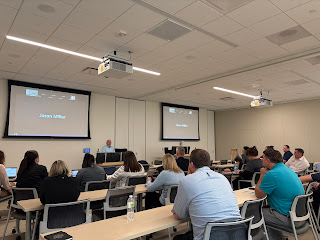Interprofessional Education
By: Brian Rose
IPE – Not just another acronym
On the eve of the Cy-Hawk trophy football game, all first-year healthcare students from the University of Iowa gathered at the Iowa
Memorial Union for our initial interprofessional education (IPE) meeting. I’d
like to share a few of my thoughts.
First, as I and many others settled into our respective
seats in the ballroom, my initial thought was, “Wow, there are a lot of students here.” This was
reaffirmed as we were told just how many students from each program were in the
room. If my memory serves me right, over 70 teams comprised of eight to nine students
from varying programs were in attendance. Programs included: medicine,
pharmacy, nursing, physical therapy, social work, dental, physician assistant,
speech pathology, and health administration.
I don’t think I would be speaking only for myself when I
say that I think most people would rather be doing something else on a Friday
afternoon. Yet, we were all here – not necessarily eager, but ready to
experience just what interprofessional education was.
I believe the experience each of us had varied somewhat
dramatically dependent on other group members and our facilitator. Fortunately,
my group members were very inclusive and focused, and we had a tremendous
facilitator. One thing I found interesting occurred during the development of
our team values. We each were asked to come up with five values, which we then
shared to the group and took the most common to come up with our team values.
For this exercise, with different professions represented within our group, I
felt there would be a variety of responses. However, I was wrong. Our group had
several overlapping values. These included values such as humility and grace,
honesty, and communication. Values such as these reflect a great advantage for
our group moving forward. Being able to put aside personal accomplishment or
status to work together is an important part of patient-centered care.
Furthermore, honest communication is essential when working in a team
environment. I was pleasantly surprised that our team had these overlapping
values, and I foresee these values helping us become successful throughout the
remainder of the course and into our professional lives.
As the three hours wound down, I became increasingly aware of
the fact that although we would rather be doing something else in the moment,
the benefit of experience like this will be rare. It is relatively easy to sit
at a table, directed by a facilitator, and discuss patient-centered care and
working together interprofessionally. However, there will be a time when it
will be necessary to be put into practice – and that will not be so easy.
Hopefully, we can lean on experiences such as the ones provided by this course
in order to facilitate proper patient-centered care. And when that day comes,
we’ll be glad we weren’t anywhere else on that Friday afternoon, because then
IPE is no longer just another acronym – it’s a way of practice.




Comments
Post a Comment